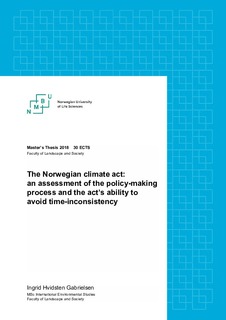The Norwegian Climate Act : an assessment of the policy-making process and the act's ability to avoid time-inconsistency
Master thesis
Permanent lenke
http://hdl.handle.net/11250/2572012Utgivelsesdato
2018Metadata
Vis full innførselSamlinger
Sammendrag
During the past decades, science has proven the effect of human made climate emissions on climate change. Human’s emissions of greenhouse gases cause a warmer and wilder climate worldwide. Thus, there is a broad, global consensus to reduce emissions to prevent further climate change. Several intergovernmental agreements have been made which aim for emission reduction, the latest is the 2015 Paris Agreement. In addition, a development of national climate acts is seen. The UK was a pioneer in this work and enacted their Climate Change Act in 2008. The Nordic countries followed suit, and Norway enacted their Climate Act in June 2017.
Both national and international policies on climate have, however, suffered from the time-inconsistency problem, where long-term policies – which are needed to solve the climate issue – are neglected in favour of short-term policies, which can be conducted and give results within a shorter time. Thus, the climate policies need measures to avoid time-inconsistency and prioritise long-term policies and measures. My motivation for this thesis has been to understand why this time-inconsistency occurs and what can be done to avoid it.
This thesis analyses the policy-making process of the Norwegian Climate Act. This includes an analysis of the actors involved and why the act was enacted at a specific time. The thesis also attempts to analyse whether the act is a good instrument for long-term planning and reduction of time-inconsistencies. The sources used are essentially official documents from the process of making the act, and interviews with persons involved in the process.
The main findings are that the policy-making process involved actors from all sectors. Most actors supported an act, while especially the economic actors were less supportive and feared an act would reduce their competitiveness. Many of the politicians, including the Government, focused on a need for cost-effective measures, while the actors who supported the act wanted it to be more stringent. They argued to include measures to prevent time-inconsistency, such as climate budgets, an advisory committee on climate change and annual reports. The only measure included in the act is annual reports, and an aim to cooperate with the EU to achieve the goals for emission reduction. Thus, this reporting, and the political opposition, ENGOs and the medias ability to give it attention and focus – in addition to a need for an establishment of a norm on emission reduction – will be crucial for the goal achievement of the act.

